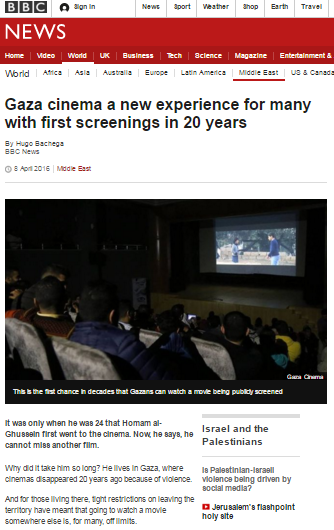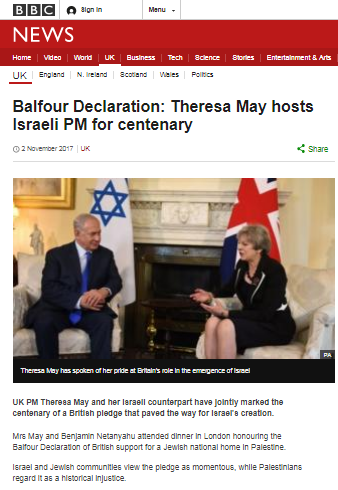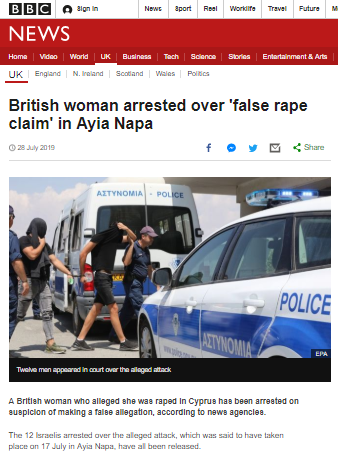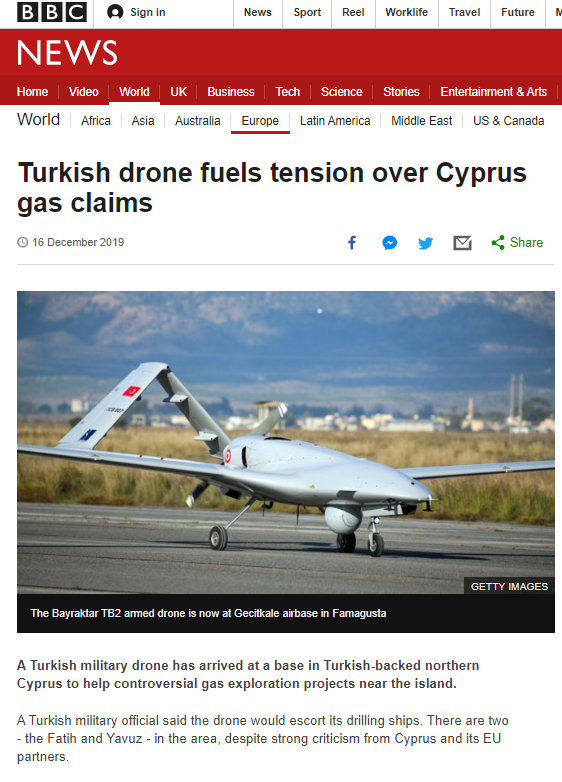April 8th saw the appearance of an article titled “Gaza cinema a new experience for many with first screenings in 20 years” in the ‘Features’ section of the BBC News website’s Middle East page. Written by Hugo Bachega, the article opens with a very vague explanation of why there have been no working cinemas in the Gaza Strip for many years.
“It was only when he was 24 that Homam al-Ghussein first went to the cinema. Now, he says, he cannot miss another film.
Why did it take him so long? He lives in Gaza, where cinemas disappeared 20 years ago because of violence.”
Readers then have to plough through a further sixteen paragraphs before they find out what that reference to “violence” means.
“But things were not always like this. Cinemas could be found in Gaza before being destroyed during the first Palestinian uprising in 1987.
Residents say back then, Islamist groups became increasingly hostile to screenings and consequently many of the movie theatres were attacked.
Residents said they were later repaired, but violence took over the territory again years later, this time a result of internal fighting between forces of the Palestinian Authority and Hamas, and the theatres were again destroyed.”
The sabotage of Gaza’s cinemas – along with other branches of the leisure and entertainment industries – by local religiously motivated extremists is obviously the real background to this story. Nevertheless, before they are given that information, readers are led to believe that there is another factor contributing to the absence of film culture in the Gaza Strip.
“And for those living there [the Gaza Strip], tight restrictions on leaving the territory have meant that going to watch a movie somewhere else is, for many, off limits.”
“Life in Gaza can be disappointing, he says. The borders of the Palestinian territory, home to about 1.9 million people, are controlled by Israel and Egypt for security reasons but criticised by human rights groups, and only people with permits are allowed to travel out.”
“Also, three wars in a decade and a blockade have left the enclave with a very poor infrastructure, and leisure options are virtually non-existent.”
The forced closure of cinemas in the Gaza Strip of course has nothing to do with – and significantly predates – the security measures imposed by Israel and Egypt in light of Hamas’ terrorist activity. Nevertheless, Bachega obviously has no issue with the shoehorning of unrelated politicized statements into this report – together with some uncritical amplification of inaccurate Hamas terminology.
“The project started in January, with Oversized Coat, from Amman-based Palestinian director Nawras Abu Saleh. It looks at Palestinian life between 1987 and 2011, including the two intifadas (uprisings) against Israeli occupation.
“These people who suffered these wars and siege are now in rows having popcorn and watching [a movie that] reflects the Palestinian situation,” Mr Abu Saleh said.
“The project is very important… because it is considered as one of the ways to break through the siege that has been forced on Gaza for 10 years.”” [emphasis added]
Bachega fails to inform his readers that there is no “siege” on the Gaza Strip just as he fails to adequately provide them with the background information necessary for their understanding of the factors which brought about the imposition of border restrictions by both Israel and Egypt.
In addition to the at least partially inaccurate claim above that “leisure options are virtually non-existent”, Bachega’s promotion of a simplistic, politicized and stereotypical narrative also includes the assertion that there are no libraries in the Gaza Strip.
“”We do not have cinemas, public libraries. There are no places to practice cultural things [and] government efforts are really shallow in this area,” says Mr Salam, who works with Ain Media company, a sponsor of the project.”
The new Palestinian Museum would presumably beg to differ in light of the findings of its recent survey: “a majority of Palestine’s libraries are located in the Gaza Strip”. So too apparently would the author of another recent survey of libraries, the director of the Public Library in the Municipality of Gaza and the staff at the Qattan Library in Gaza City.
Hugo Bachega could have used the opportunity provided by these new film screenings in the Gaza Strip to provide BBC audiences with rarely seen insight into the way in which Hamas’ religious extremism has affected the lives of the general public in the Gaza Strip. Instead, his minimal treatment of that issue is further watered down by the claim that “Hamas is seen to be slightly relaxing its grip on cultural activities in the territory” even as it continues to practice censorship of films and by his euphemistic portrayal of Hamas as a movement with “conservative views”.
Bachega’s references to the security measures imposed by Israel in relation to its border with the Gaza Strip have nothing to do with the story he is supposedly telling and are clearly narrative-driven. Further, having included them in the article, he fails to meet BBC editorial guidelines on accuracy and impartiality by providing readers with an explanation for their existence beyond the immediately qualified phrase “for security reasons” and even goes on to amplify Hamas terminology concerning border restrictions.
Had Bachega bothered to meet those editorial guidelines, then BBC audiences – and he – might have come to appreciate the fact that the same extremist Islamist ideology which prompted the burning down of cinemas in the Gaza Strip also lies behind Israel’s need for border security measures.
Related Articles:




